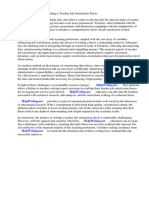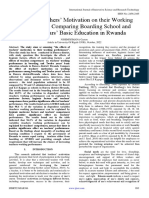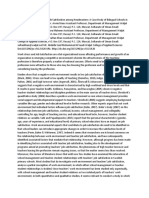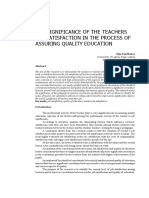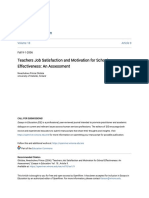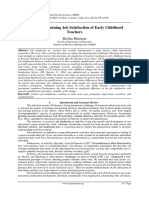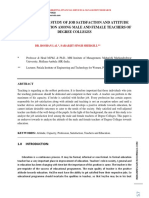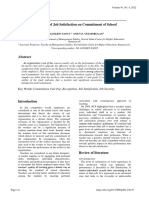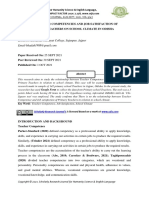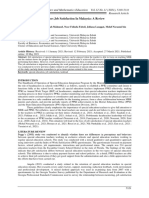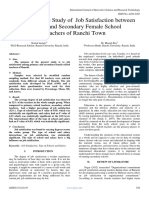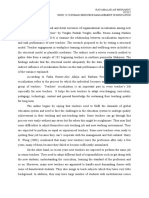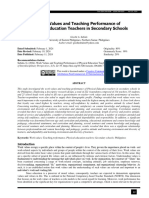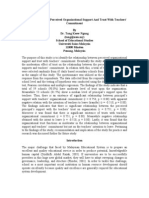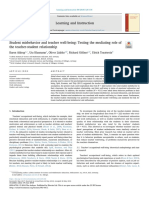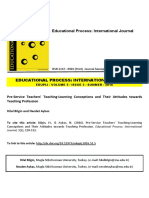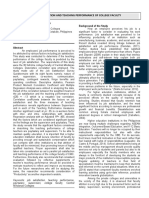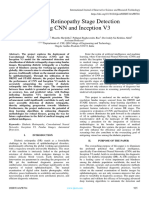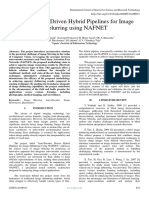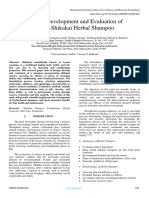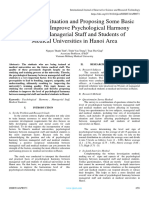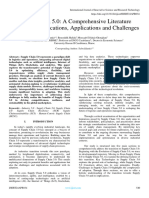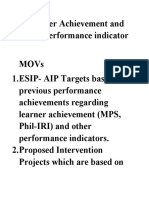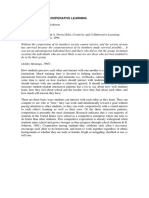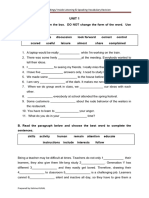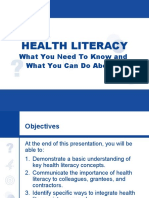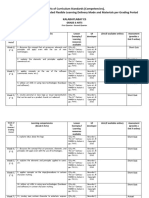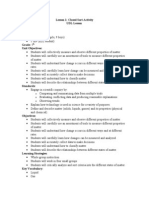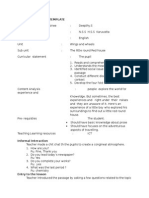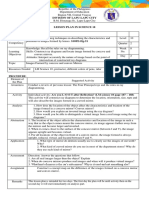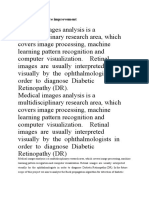Professional Documents
Culture Documents
A Study of Factors Affecting Job Satisfaction of Teacher Educators in Relation To Their Gender, Age, Marital Status and Academic Qualification
Original Title
Copyright
Available Formats
Share this document
Did you find this document useful?
Is this content inappropriate?
Report this DocumentCopyright:
Available Formats
A Study of Factors Affecting Job Satisfaction of Teacher Educators in Relation To Their Gender, Age, Marital Status and Academic Qualification
Copyright:
Available Formats
Volume 6, Issue 11, November – 2021 International Journal of Innovative Science and Research Technology
ISSN No:-2456-2165
A Study of Factors Affecting Job Satisfaction of
Teacher Educators in Relation to their Gender, Age,
Marital Status and Academic Qualification
GIRI GIRI SRAVANTHI MAHENDER REDDY SARSANI
Research Scholar Prof., Dean Faculty of Education, Principal & HEAD
University College of Education University College of Education
Kakatiya University, Telangana State Kakatiya University, Telangana State
Abstract:- The study is aimed to find job satisfaction of A. Job Satisfaction of Teacher Educator
teacher educators in Telangana State. In relation to Job satisfaction can be a good predictor of work
gender, age, marital status and academic qualification. behaviours including organisational citizenship, absenteeism,
The simple random technique was used to select the sample and turnover for Teacher Educators. Furthermore, job
of 230 members of teacher educators of Telangana State. satisfaction can moderate the association between personality
Survey method was used for the study. A tool Job traits and aberrant work behaviours to some extent.
Satisfaction Scale was developed by the scholar. The
results show that female teacher educators have more job The job happiness of teachers is vital not just to the
satisfaction than male teacher educators and their age, teachers, but also to the kids. Job satisfaction can indicate
marital status but academic qualifications do not have teacher retention and commitment (Shann, 2001). This
relationship with job satisfaction. demonstrates the importance of job happiness for school
teachers.
Keywords:- Job Satisfaction; Teaching Conditions; Work
Environment; Job Satisfaction Style. If teacher educators are under stress, they will be
dissatisfied with their jobs and have a bad attitude about them.
I. INTRODUCTION As a result, it is critical to determine the elements that
influence teacher educators' happiness with their jobs. Teacher
Kilpotrick (1994) says one train’s circus performers and educators have the ability to transform student teachers' raw
animals but one educates the teachers consequently the new materials into exceptional completed goods, such as whole
term teacher education has been adopted replacing the term human beings and responsible teachers. When the teacher
teacher training. educators are happy with their work, they might generate more
energy. Teacher education will gradually be transferred into
Teachers have a profound impact on the lives of our multidisciplinary colleges and universities, as the best teachers
children, and thus on the destiny of our country. Our children will require training in a variety of material as well as
learn values, knowledge, empathy, creativity, ethics, life skills, pedagogy. As schools and universities strive to become more
and social responsibility from their teachers. Today, the multidisciplinary, great education departments offering B.Ed.
prestige of the teacher has unquestionably and regrettably and M.Ed. degrees will become more prevalent.
deteriorated. The quality of teacher training, recruitment,
deployment, service conditions, and empowerment is not II. LITERATURE SURVEY
where it should be, and as a result, the quality and motivation
of teachers is not up to par. For the best to be inspired to enter Melaku & Hunde (2020) studied on Factors Affecting
the profession, for teachers to be well motivated and Teachers Job Satisfaction in case of in Wachemo University.
empowered to innovate, and for education to reach the heights The study included 768 teachers, and the findings revealed that
and levels that are truly required to ensure the best possible salary, stressful work, overtime work without pay,
future for our children and nation, the high respect for teachers relationships with top management, opportunities for
and the high status of the teaching profession must be revived advancement, chance for promotion, and availability of
and restored. teaching learning materials, as well as campus rules and
regulations, all affect teachers' job satisfaction.
The most important component in determining worker
motivation, effectiveness, retention, and performance is job Crisci, Sepe & Malafronte (2019) studied the influences
satisfaction. It's a pleasant, optimistic state brought on by one's teachers’ job satisfaction and how to improve, develop and
work and work experiences (Bashayreh, 2009). This reorganize the school activities associated with them.
encompasses the individual's affective attitude or work Communication, involvement, leadership, school climate,
orientations, in addition to the unique task environment of the structure, and job satisfaction were identified as the six
employees. (Bashayreh, 2009:7) primary determinants determining teacher satisfaction using
descriptive analysis.
IJISRT21NOV178 www.ijisrt.com 451
Volume 6, Issue 11, November – 2021 International Journal of Innovative Science and Research Technology
ISSN No:-2456-2165
Harsha, Helina, and Peter (2018) conducted research to A. Tool used for the study
determine personality characteristics among teachers and their The researcher reviewed Questionnaire on Teacher
relationships with self-efficacy, work engagement, and job Effectiveness constrcted and standerdised by Sujatha Mishra
happiness. They investigate the relationships between profile (1999), Student Assessment of Learning and Teaching
membership and teacher self-efficacy for teaching, work (SALT) the sage college approved by the sage college faculty
engagement, and job happiness. The findings give new (2014), Teacher Self-Efficacy Scale by Bandura (1997). The
evidence that suggests trait interactions, rather than just Personality Inventory is developed and standardized by
additive personality effects, should be considered in models of Mahesh Bhargava (2002) and finally Factor analysis
teacher attrition, effectiveness, or selection. techniques were used for developed and adopted standardized
techniques. The research tool was developed with 82 items by
Kulandi and Babu (2017) conducted a correlative study the scholar labelled as Job Satisfaction Scale (JSS) to measure
of teacher-educators' job satisfaction and occupational stress the factors are affecting on job satisfaction of teacher
in relation to selected variables with a sample of 450 teachers. educators. In this scale, against each item is provided with five
It was decided to use the normative survey method. The alternatives i.e. Strongly Agree, Agree, Undecided, Disagree
following were the main findings: I it was discovered that and Strongly Disagree.
there is a substantial difference in the mean job satisfaction
scores of male and female teacher-educators working in a The number of factors is ‘eleven’, but on the basis of
college of education. ii) It is determined that the mean job groupings made by factor analysis, ‘eleven’ components are
satisfaction scores of married and unmarried teacher-educators clubbed together to form 82 components and named on the
working in the college of education differ significantly. basis of majority of the sub-factors therein. Since majority of
the sub-factors in Component are 1) Organisational,
A. Objectives of the study Administrative styles and Policies of the Institution, 2)
To find out the Teacher Educators’ job satisfaction in Teaching Efficiency, 3) Job related issues, 4) Teaching
relation to their gender, age, marital status, type of family and Competencies, 5) Working Conditions, 6) Relationship with
community. student-teacher and colleagues, 7) Emoluments and Personal
matters, 8) Evaluation and feedback system, 9) Duties and
B. Hypotheses Responsibilities, 10) Freedom in Planning and Execution of
Hypothesis-1: There is no significant mean difference between work and 11) Commitment towards Profession.
the male and female teacher educators on their job satisfaction.
Hypothesis-2: There is no significant mean difference among After discussing the results of present research on the
the age groups of teacher educators on their job satisfaction. basis of various statistical tools, the next step is to draw
Hypothesis-3: There is no significant mean difference between conclusions.
the married and unmarried teacher educators on their job
satisfaction. B. Data collection procedure
Hypothesis-4: There is no significant mean difference between Permission was obtained from the principals to undertake
the M.A/M.Com/M.Sc and M.Phil/Ph.D. teacher educators on the research work in Teacher Education Institutes (TEI) of
their job satisfaction. telangana state . The Job Satisfaction Scale (JSS) was given to
the teacher educators. The instructions were given orally to the
III. METHODOLOGY teacher educators to read the direction given in the booklet.
The Normative Survey Method is used in the present C. Validity and Reliability
research to obtain the pertinent precise information concerning While standardizing the test, the test-constructors
the current status of teacher education and whenever possible established validity and reliability. However, the researchers
to draw valid general conclusions from the facts discovered. administered the tool on a small group (N=100) to examine the
The method reports us about what exist at present by usability or practicability of reliability and validity of the test.
determining the nature and degree of existing conditions. The (test-retest method) pilot study was applied for the test.
The calculated Reliability co-efficient was 0.84 between test
The sample for the investigation was drawn from various and retest.
teacher education institutions of Telangana State, a total of 230
teacher educators (lecturers) were selected by Simple Random Validity is the quality of data-gathering instrument or
sampling technique. The sample includes 61.3% teacher procedure that enables it to determine what it was designed to
educators were male 38.6% teacher educators were female. determine (Best, 1983). In other words, validity refers to
ability is also to measure to as "the extent to which the
procedure actually accomplishes what it seeks to accomplish
or measure what it seek to measure" (Fox, 1969). The validity
of the test was explained in the manuals. The items included
in the test were valid as they could elicit the intended
information.
IJISRT21NOV178 www.ijisrt.com 452
Volume 6, Issue 11, November – 2021 International Journal of Innovative Science and Research Technology
ISSN No:-2456-2165
IV. RESULTS
Sample Statistical test and
variable category Mean SD
size values
Male 140 293.7 23.3
Gender t = 2.72**
Female 90 302.3 23.7
26-35 years 103 298.9 23.9 t =1.01 #
Age
36 years and above 130 295.6 23.6
Table -1: shows the category, sample size, Mean, SD with statistical test and values
*significant at 0.05 level
# Not significant even at 0.05 level
The table-1 evident that male teacher educators mean
score on overall Job Satisfaction Scale (JSS) is 293.7 and The same table revels that the 26-35 years age teacher
female teacher educators mean score is 302.3; and SDs for the educators mean score of overall JSS Job Satisfaction Scale
same groups being 23.3 and 23.7 respectively. The t- value is (JSS) is 298.9 and 36 years and above age teacher educators
found to be 2.72 which is significant at 0.01 level. Hence, there mean score is 295.6; and SDs for the same groups being 23.9
is significant difference between male and female teacher and 23.6 respectively. The t-value is found to be 1.01, which
educators on the Job Satisfaction. The female teacher is not significant at 0.05 level. Hence, there is no significant
educators have more Job Satisfaction than their male teacher difference between 26-35 years and 33 years and above
educators. teacher educators on the job satisfaction.
variable category Sample Mean SD Statistical test and
size values
Marital Status
Married 200 297.8 24.1 t = 1.35#
Unmarried 292.1 21.1
30
M.A/M.COM/M.SC 225 297.1 23.9
Academic Qualification t = 0.24 #
M.Phil 5 295.2 17.1
Table -2: shows the category, sample size, Mean, SD with statistical test and values
# Not significant even at 0.05 level
Table2 is evident that married teacher educators mean V. CONCLUSIONS AND DISCUSSION
scores on Job Satisfaction Scale (JSS) is 297.8 and unmarried
teacher educators mean score is 292.1 And the SDs for the The study results revealed that gender have shown
same groups benign 24.1 and 21.1 respectively. The t-value is significant influence on Job Satisfaction of teacher educators.
found to be 1.35, which is not significant even at 0.05 levels. However, the study found that age, marital status, academic
Hence, there is no significant difference between married and qualifications has no influence on the job satisfaction of
unmarried teacher educators on the job satisfaction. teacher educators working in teacher education institutions.
The same table revels the M.A / M.Com. / M.Sc The female teacher educators are more satisfied in their
Qualification teacher educators mean scores on Job job than male teacher educators. The majority of female
Satisfaction Scale (JSS) is 297.1 and M.Phil/Ph.D. teacher educators salary is secondary income for their family,
Qualification teacher educators mean score is 295.2 and the whereas the male teacher educators salary may not be
SDs for the same groups being 23.9 and 17.1 respectively. The sufficient for maintaining his family and dependents. So that
t-value is found to be 0.24, which is not significant even at male teacher educators may have dissatisfaction with their
0.05 levels. Hence, there is no significant difference between jobs.
M.A/M.Com/M.Sc and M.Phil/Ph.D. Qualification teacher
educators on the job satisfaction. The conclusions drawn from the present study reveals
certain important implications which are meaningful for the
teacher educators, and the educational administrators and
policy makers.
IJISRT21NOV178 www.ijisrt.com 453
Volume 6, Issue 11, November – 2021 International Journal of Innovative Science and Research Technology
ISSN No:-2456-2165
REFERENCES
[1]. Best J.W. "Research in Education" Prentice Hall of
India Pvt. Ltd. New Delhi 1997.
[2]. Crisci,A., Sepe, E & Malafronte, P. (2019), What
influences teachers’ job satisfaction and how to improve,
develop and reorganize the school activities associated
with them, Quality & Quantity: International Journal of
Methodology, 53, (5), 2403-2419
[3]. Garrett, H.E. (2005). Statistics in Education and
Psychology. Paragaon International Publication Delhi.
[4]. https://cpb-us-
w2.wpmucdn.com/u.osu.edu/dist/2/5604/files/2014/09/
Bandura-Instr-1sdm5sg.pdf
[5]. https://www.slideshare.net/BEdEnglishEng/08-chapter-
3-1
[6]. Mangal, S.K. (1988). General Psychology. New Delhi:
Sterling publisher PVT Limited.
[7]. Melaku, S.M, & Hunde, T.S. (2020). Factors Affecting
Teachers Job Satisfaction in Case of Wachemo
University. International Journal of Psychological
Studies. Vol.12, No.3.
[8]. Mishra, S (2005). Gandhian Alternative Education for
Self-realisation. New Delhi: concept publishing
company. ( published for Gandhi Samiti and darshan
samiti). vol-V.
[9]. Harsha, P., Helina, G. and Peter, M (2018). Profiles of
teacher personality and relations with teacher self-
efficacy, work engagement, and job satisfaction. USQ
ePrints, pp. 171-178. ISSN 0191-8869,
http://www.sciencedirect.com/science/article/pii/S0191
886917305354
[10]. Kilpatrick, R.N. (1962). The Relationship ofJob
Satisfaction to Perceived Staff Promotional Policies.
Doct Diss. Stanford University
IJISRT21NOV178 www.ijisrt.com 454
You might also like
- Effects of an Inclusion Professional Development Model on Inclusion Knowledge and Perceptions of Regular Middle School EducatorsFrom EverandEffects of an Inclusion Professional Development Model on Inclusion Knowledge and Perceptions of Regular Middle School EducatorsNo ratings yet
- The Principal’s Playbook on Instructional Leadership:: 23 Things That Matter Most for Improving Student AchievementFrom EverandThe Principal’s Playbook on Instructional Leadership:: 23 Things That Matter Most for Improving Student AchievementNo ratings yet
- Teacher Job Satisfaction ThesisDocument8 pagesTeacher Job Satisfaction Thesisdianaolivanewyork100% (2)
- Vol. II3 803 819Document17 pagesVol. II3 803 819lcampanoNo ratings yet
- Theory JobDocument23 pagesTheory JobnadiahafinaNo ratings yet
- Teachers Job Satisfaction of Government Schools of Kathmandu District 1Document9 pagesTeachers Job Satisfaction of Government Schools of Kathmandu District 1Rocky MaharjanNo ratings yet
- Determinants of Job Satisfaction Among Elementary Teachers in Ibaan DistrictDocument10 pagesDeterminants of Job Satisfaction Among Elementary Teachers in Ibaan DistrictEmiliana Madlangbayan RoxasNo ratings yet
- Effect of Teachers' Motivation On Their Working Performance. Comparing Boarding School and Twelve Years' Basic Education in RwandaDocument8 pagesEffect of Teachers' Motivation On Their Working Performance. Comparing Boarding School and Twelve Years' Basic Education in RwandaInternational Journal of Innovative Science and Research TechnologyNo ratings yet
- Relationship Between Teachers'Self-Efficacy Perceptions and Job Satisfaction LevelDocument5 pagesRelationship Between Teachers'Self-Efficacy Perceptions and Job Satisfaction LevelJay GalangNo ratings yet
- Job Satisfaction and Performance of Public Secondary School Teachers in Bataraza, PalawanDocument7 pagesJob Satisfaction and Performance of Public Secondary School Teachers in Bataraza, PalawanPsychology and Education: A Multidisciplinary JournalNo ratings yet
- A Comparative Study of Professional Attitude of Secondary School TeachersDocument8 pagesA Comparative Study of Professional Attitude of Secondary School TeachersAnonymous CwJeBCAXpNo ratings yet
- The Mediating Effects of Meta Cognitive Awareness On The Relationship Between Professional Commitment On Job SatisfactionDocument16 pagesThe Mediating Effects of Meta Cognitive Awareness On The Relationship Between Professional Commitment On Job SatisfactionInternational Journal of Innovative Science and Research TechnologyNo ratings yet
- Adapted Physical Education Teachers Job SatisfactionDocument21 pagesAdapted Physical Education Teachers Job Satisfactionmiquelgrauh24No ratings yet
- A Study On Stress Management Skills and Job Satisfaction Among Teachers1Document14 pagesA Study On Stress Management Skills and Job Satisfaction Among Teachers1DrJudan Silos Fructuoso DMinNo ratings yet
- IJRPR15649Document5 pagesIJRPR15649Tetty JPCNo ratings yet
- ASTENJournal-V2-I1-Self-efficacy and JobDocument9 pagesASTENJournal-V2-I1-Self-efficacy and JobNu Nu NyuntNo ratings yet
- Identifying Teachers Job SatisfactionDocument8 pagesIdentifying Teachers Job SatisfactionDani WardaniNo ratings yet
- AbstractDocument21 pagesAbstractYugesh YugiNo ratings yet
- 23855-Article Text-60731-69619-10-20221215 PDFDocument23 pages23855-Article Text-60731-69619-10-20221215 PDFAliftaNo ratings yet
- Teachers' Morale and Its Impact To Their Working EfficiencyDocument8 pagesTeachers' Morale and Its Impact To Their Working EfficiencyRad John BelarminoNo ratings yet
- 2 34 1364823381 2THESIGNIFICANT Full PDFDocument9 pages2 34 1364823381 2THESIGNIFICANT Full PDFRezza Gift GallardoNo ratings yet
- The Significance of The Teachers Job SatisfactionDocument12 pagesThe Significance of The Teachers Job SatisfactionAbdulbasid Ahmad AlbarkawaNo ratings yet
- Article by NSHIMIYIMANA GASTONDocument13 pagesArticle by NSHIMIYIMANA GASTONngaston2020No ratings yet
- Job Satisfaction and Performance of The Faculty in The College of Teacher EducationDocument16 pagesJob Satisfaction and Performance of The Faculty in The College of Teacher EducationDenver Iñigo PartibleNo ratings yet
- Teachers Job Satisfaction and MotivationDocument20 pagesTeachers Job Satisfaction and MotivationFaraidoon EnglishNo ratings yet
- Factors Determining Job Satisfaction of Early Childhood TeachersDocument6 pagesFactors Determining Job Satisfaction of Early Childhood TeachersHafsaNo ratings yet
- Relationship Between Organizational Climate and Job Satisfaction Among Teachers in Terms of AreaDocument6 pagesRelationship Between Organizational Climate and Job Satisfaction Among Teachers in Terms of AreaAnonymous CwJeBCAXpNo ratings yet
- A Comparative Study of Job Satisfaction and Attitude Towards Education Among Male and Female Teachers of Degree CollegesDocument9 pagesA Comparative Study of Job Satisfaction and Attitude Towards Education Among Male and Female Teachers of Degree CollegesShivam VermaNo ratings yet
- Seminar PaperDocument16 pagesSeminar PaperChiek SingNo ratings yet
- Nanci JournalDocument6 pagesNanci JournalAuslienNanciNo ratings yet
- Impact of Teacher Competencies and Job Satisfaction of Primary School Teachers On School Climate in OdishaDocument11 pagesImpact of Teacher Competencies and Job Satisfaction of Primary School Teachers On School Climate in OdishaAnonymous CwJeBCAXp100% (1)
- A Study On Job Satisfaction of Teachers Working in Mount Seena Public School Pthirippala Palakkad DT With Special Reference To Cbse Borad 1474 PDFDocument5 pagesA Study On Job Satisfaction of Teachers Working in Mount Seena Public School Pthirippala Palakkad DT With Special Reference To Cbse Borad 1474 PDFJilson JosephNo ratings yet
- Job Satisfaction of School TeachersDocument7 pagesJob Satisfaction of School TeachersSPARTANSNo ratings yet
- Job Satisfaction and Teaching PerformancDocument7 pagesJob Satisfaction and Teaching PerformancDesiree Aranggo MangueraNo ratings yet
- The Principals' Leadership Style and Its Impact On The Teachers' Sense of Efficacy and Job Satisfaction in Selected Secondary High SchoolsDocument14 pagesThe Principals' Leadership Style and Its Impact On The Teachers' Sense of Efficacy and Job Satisfaction in Selected Secondary High SchoolsPsychology and Education: A Multidisciplinary JournalNo ratings yet
- 434-Article Text-1997-2-10-20220702 (1)Document10 pages434-Article Text-1997-2-10-20220702 (1)eyaluayssa10qNo ratings yet
- 6758-Article Text-12429-1-10-20210518Document4 pages6758-Article Text-12429-1-10-20210518PRINCESS STELLA MARIENo ratings yet
- Teachers' SES relationship with morale & performanceDocument5 pagesTeachers' SES relationship with morale & performanceShaguolo O. JosephNo ratings yet
- A Comparative Study of Job Satisfaction Between Primary and Secondary Female School Teachers of Ranchi TownDocument5 pagesA Comparative Study of Job Satisfaction Between Primary and Secondary Female School Teachers of Ranchi TownInternational Journal of Innovative Science and Research TechnologyNo ratings yet
- In Uence of Motivation On Teachers' Job Performance: ArticleDocument11 pagesIn Uence of Motivation On Teachers' Job Performance: Articlekhanhlinhtran139No ratings yet
- Article ReviewDocument4 pagesArticle ReviewNavamalarNo ratings yet
- U Htay Lwin (267-279)Document13 pagesU Htay Lwin (267-279)Yoj BelermaNo ratings yet
- Determinants of Primary School Teachers' Level of Self-EfficacyDocument10 pagesDeterminants of Primary School Teachers' Level of Self-EfficacyJournal of Interdisciplinary PerspectivesNo ratings yet
- Work Values and Teaching Performance of Physical Education Teachers in Secondary Schools of Central Area Districts, Division of Northern SamarDocument14 pagesWork Values and Teaching Performance of Physical Education Teachers in Secondary Schools of Central Area Districts, Division of Northern SamarJournal of Interdisciplinary PerspectivesNo ratings yet
- The Influence of School Facilities and Effectiveness On The Satisfaction of Teachers in Public SchoolsDocument12 pagesThe Influence of School Facilities and Effectiveness On The Satisfaction of Teachers in Public SchoolsIJAR JOURNALNo ratings yet
- Job Satisfaction-Intro To FinalDocument23 pagesJob Satisfaction-Intro To Finalmharlit cagaananNo ratings yet
- Paper Presentation Word Teacher InfluenceDocument11 pagesPaper Presentation Word Teacher Influence17ust030No ratings yet
- Teacher Self-Efficacy Profiles-Determinants, Outcomes, and Generalizability Across Teaching LevelDocument18 pagesTeacher Self-Efficacy Profiles-Determinants, Outcomes, and Generalizability Across Teaching LevelMichelle PajueloNo ratings yet
- Motivation and teachers' job performanceDocument14 pagesMotivation and teachers' job performanceKarla Arsenia AumentadoNo ratings yet
- Job Satisfaction of Teachers in Sri Venugopal VidyalayaDocument4 pagesJob Satisfaction of Teachers in Sri Venugopal VidyalayaNirmala kNo ratings yet
- Atik, S., & Celik, O. T. (2020). An Investigation of the Relationship between School Principals' Empowering Leadership Style and Teacher's Job Satisfaction; The Role of Trust and Psychological EmpowermentDocument18 pagesAtik, S., & Celik, O. T. (2020). An Investigation of the Relationship between School Principals' Empowering Leadership Style and Teacher's Job Satisfaction; The Role of Trust and Psychological EmpowermentAdis AuraNo ratings yet
- A Study of Adjustment of Teachers Working in Secondary Schools in Haryana in Relation To Sex, Place of Working, Marital Status and Academic ResultsDocument7 pagesA Study of Adjustment of Teachers Working in Secondary Schools in Haryana in Relation To Sex, Place of Working, Marital Status and Academic ResultsAnonymous CwJeBCAXpNo ratings yet
- Job Satisfaction and Work Stress Affects Performance of Teachers by RhonaDocument25 pagesJob Satisfaction and Work Stress Affects Performance of Teachers by RhonaDrJudan Silos Fructuoso DMinNo ratings yet
- Relationship Between Perceived Organizational Support and Trust With Teachers' CommitmentDocument12 pagesRelationship Between Perceived Organizational Support and Trust With Teachers' CommitmentyoolandNo ratings yet
- Effects of Gender On Teachers' Perceptions of School Environment, Teaching Efficacy, Stress and Job SatisfactionDocument11 pagesEffects of Gender On Teachers' Perceptions of School Environment, Teaching Efficacy, Stress and Job Satisfactiondeviraj22No ratings yet
- Hmee5043 Assignment 2Document18 pagesHmee5043 Assignment 2Norihan Kamal100% (1)
- Learning and Instruction: A A A B C D DDocument11 pagesLearning and Instruction: A A A B C D DLarisa LavNo ratings yet
- Files 1 Articles Article 35 EDUPIJ 35 Article 56d7533f2f244Document14 pagesFiles 1 Articles Article 35 EDUPIJ 35 Article 56d7533f2f244nin adninn91No ratings yet
- Job Satisfaction Predicts Teaching PerformanceDocument7 pagesJob Satisfaction Predicts Teaching PerformanceabidchannaNo ratings yet
- 08 Chapter 2Document52 pages08 Chapter 2Jim LaabNo ratings yet
- Comparatively Design and Analyze Elevated Rectangular Water Reservoir with and without Bracing for Different Stagging HeightDocument4 pagesComparatively Design and Analyze Elevated Rectangular Water Reservoir with and without Bracing for Different Stagging HeightInternational Journal of Innovative Science and Research TechnologyNo ratings yet
- Diabetic Retinopathy Stage Detection Using CNN and Inception V3Document9 pagesDiabetic Retinopathy Stage Detection Using CNN and Inception V3International Journal of Innovative Science and Research TechnologyNo ratings yet
- The Utilization of Date Palm (Phoenix dactylifera) Leaf Fiber as a Main Component in Making an Improvised Water FilterDocument11 pagesThe Utilization of Date Palm (Phoenix dactylifera) Leaf Fiber as a Main Component in Making an Improvised Water FilterInternational Journal of Innovative Science and Research TechnologyNo ratings yet
- Advancing Healthcare Predictions: Harnessing Machine Learning for Accurate Health Index PrognosisDocument8 pagesAdvancing Healthcare Predictions: Harnessing Machine Learning for Accurate Health Index PrognosisInternational Journal of Innovative Science and Research TechnologyNo ratings yet
- Dense Wavelength Division Multiplexing (DWDM) in IT Networks: A Leap Beyond Synchronous Digital Hierarchy (SDH)Document2 pagesDense Wavelength Division Multiplexing (DWDM) in IT Networks: A Leap Beyond Synchronous Digital Hierarchy (SDH)International Journal of Innovative Science and Research TechnologyNo ratings yet
- Electro-Optics Properties of Intact Cocoa Beans based on Near Infrared TechnologyDocument7 pagesElectro-Optics Properties of Intact Cocoa Beans based on Near Infrared TechnologyInternational Journal of Innovative Science and Research TechnologyNo ratings yet
- Formulation and Evaluation of Poly Herbal Body ScrubDocument6 pagesFormulation and Evaluation of Poly Herbal Body ScrubInternational Journal of Innovative Science and Research TechnologyNo ratings yet
- Terracing as an Old-Style Scheme of Soil Water Preservation in Djingliya-Mandara Mountains- CameroonDocument14 pagesTerracing as an Old-Style Scheme of Soil Water Preservation in Djingliya-Mandara Mountains- CameroonInternational Journal of Innovative Science and Research TechnologyNo ratings yet
- The Impact of Digital Marketing Dimensions on Customer SatisfactionDocument6 pagesThe Impact of Digital Marketing Dimensions on Customer SatisfactionInternational Journal of Innovative Science and Research TechnologyNo ratings yet
- A Review: Pink Eye Outbreak in IndiaDocument3 pagesA Review: Pink Eye Outbreak in IndiaInternational Journal of Innovative Science and Research TechnologyNo ratings yet
- Auto Encoder Driven Hybrid Pipelines for Image Deblurring using NAFNETDocument6 pagesAuto Encoder Driven Hybrid Pipelines for Image Deblurring using NAFNETInternational Journal of Innovative Science and Research TechnologyNo ratings yet
- Design, Development and Evaluation of Methi-Shikakai Herbal ShampooDocument8 pagesDesign, Development and Evaluation of Methi-Shikakai Herbal ShampooInternational Journal of Innovative Science and Research Technology100% (3)
- A Survey of the Plastic Waste used in Paving BlocksDocument4 pagesA Survey of the Plastic Waste used in Paving BlocksInternational Journal of Innovative Science and Research TechnologyNo ratings yet
- Cyberbullying: Legal and Ethical Implications, Challenges and Opportunities for Policy DevelopmentDocument7 pagesCyberbullying: Legal and Ethical Implications, Challenges and Opportunities for Policy DevelopmentInternational Journal of Innovative Science and Research TechnologyNo ratings yet
- Hepatic Portovenous Gas in a Young MaleDocument2 pagesHepatic Portovenous Gas in a Young MaleInternational Journal of Innovative Science and Research TechnologyNo ratings yet
- Explorning the Role of Machine Learning in Enhancing Cloud SecurityDocument5 pagesExplorning the Role of Machine Learning in Enhancing Cloud SecurityInternational Journal of Innovative Science and Research TechnologyNo ratings yet
- Navigating Digitalization: AHP Insights for SMEs' Strategic TransformationDocument11 pagesNavigating Digitalization: AHP Insights for SMEs' Strategic TransformationInternational Journal of Innovative Science and Research TechnologyNo ratings yet
- Perceived Impact of Active Pedagogy in Medical Students' Learning at the Faculty of Medicine and Pharmacy of CasablancaDocument5 pagesPerceived Impact of Active Pedagogy in Medical Students' Learning at the Faculty of Medicine and Pharmacy of CasablancaInternational Journal of Innovative Science and Research TechnologyNo ratings yet
- Automatic Power Factor ControllerDocument4 pagesAutomatic Power Factor ControllerInternational Journal of Innovative Science and Research TechnologyNo ratings yet
- Mobile Distractions among Adolescents: Impact on Learning in the Aftermath of COVID-19 in IndiaDocument2 pagesMobile Distractions among Adolescents: Impact on Learning in the Aftermath of COVID-19 in IndiaInternational Journal of Innovative Science and Research TechnologyNo ratings yet
- Review of Biomechanics in Footwear Design and Development: An Exploration of Key Concepts and InnovationsDocument5 pagesReview of Biomechanics in Footwear Design and Development: An Exploration of Key Concepts and InnovationsInternational Journal of Innovative Science and Research TechnologyNo ratings yet
- Studying the Situation and Proposing Some Basic Solutions to Improve Psychological Harmony Between Managerial Staff and Students of Medical Universities in Hanoi AreaDocument5 pagesStudying the Situation and Proposing Some Basic Solutions to Improve Psychological Harmony Between Managerial Staff and Students of Medical Universities in Hanoi AreaInternational Journal of Innovative Science and Research TechnologyNo ratings yet
- The Effect of Time Variables as Predictors of Senior Secondary School Students' Mathematical Performance Department of Mathematics Education Freetown PolytechnicDocument7 pagesThe Effect of Time Variables as Predictors of Senior Secondary School Students' Mathematical Performance Department of Mathematics Education Freetown PolytechnicInternational Journal of Innovative Science and Research TechnologyNo ratings yet
- Drug Dosage Control System Using Reinforcement LearningDocument8 pagesDrug Dosage Control System Using Reinforcement LearningInternational Journal of Innovative Science and Research TechnologyNo ratings yet
- Securing Document Exchange with Blockchain Technology: A New Paradigm for Information SharingDocument4 pagesSecuring Document Exchange with Blockchain Technology: A New Paradigm for Information SharingInternational Journal of Innovative Science and Research TechnologyNo ratings yet
- Enhancing the Strength of Concrete by Using Human Hairs as a FiberDocument3 pagesEnhancing the Strength of Concrete by Using Human Hairs as a FiberInternational Journal of Innovative Science and Research TechnologyNo ratings yet
- Formation of New Technology in Automated Highway System in Peripheral HighwayDocument6 pagesFormation of New Technology in Automated Highway System in Peripheral HighwayInternational Journal of Innovative Science and Research TechnologyNo ratings yet
- Supply Chain 5.0: A Comprehensive Literature Review on Implications, Applications and ChallengesDocument11 pagesSupply Chain 5.0: A Comprehensive Literature Review on Implications, Applications and ChallengesInternational Journal of Innovative Science and Research TechnologyNo ratings yet
- Intelligent Engines: Revolutionizing Manufacturing and Supply Chains with AIDocument14 pagesIntelligent Engines: Revolutionizing Manufacturing and Supply Chains with AIInternational Journal of Innovative Science and Research TechnologyNo ratings yet
- The Making of Self-Disposing Contactless Motion-Activated Trash Bin Using Ultrasonic SensorsDocument7 pagesThe Making of Self-Disposing Contactless Motion-Activated Trash Bin Using Ultrasonic SensorsInternational Journal of Innovative Science and Research TechnologyNo ratings yet
- Least Learned CompetencyDocument2 pagesLeast Learned Competencygladys baldeoNo ratings yet
- Module 1 Understanding Globalization 2nd TermDocument3 pagesModule 1 Understanding Globalization 2nd TermBianca GuevarraNo ratings yet
- MOVs Learner Achievement and Other Performance IndicatorDocument31 pagesMOVs Learner Achievement and Other Performance IndicatorMichelle OlegarioNo ratings yet
- Personality Theory and Research 13th Edition Cervone Test BankDocument22 pagesPersonality Theory and Research 13th Edition Cervone Test BankJacobRandallojnpm100% (13)
- An Overview of Cooperative Learning.Document9 pagesAn Overview of Cooperative Learning.Gabriela RodriguezNo ratings yet
- Myths and Misconceptions About PsychologyDocument2 pagesMyths and Misconceptions About PsychologyMarion LericheNo ratings yet
- Select Readings - UNIT 1 - Vocabulary PracticeDocument5 pagesSelect Readings - UNIT 1 - Vocabulary PracticeishaknazmiyakutNo ratings yet
- Improve Health Outcomes with Effective Health LiteracyDocument91 pagesImprove Health Outcomes with Effective Health Literacya_roy003No ratings yet
- Learning InsightsDocument1 pageLearning InsightsSecre NeroNo ratings yet
- Physiological perspective of the self: Group 2 presentationDocument44 pagesPhysiological perspective of the self: Group 2 presentationjunNo ratings yet
- Arts 6Document4 pagesArts 6luisaNo ratings yet
- Science Udl Lesson 1Document5 pagesScience Udl Lesson 1api-238637442100% (1)
- Ip Lsp401 Sem 1 2018 2019 StudentsDocument4 pagesIp Lsp401 Sem 1 2018 2019 StudentsSyamiNas-miNo ratings yet
- PLV Orientation Slides - Language and LiteratureDocument30 pagesPLV Orientation Slides - Language and Literatureariel villarNo ratings yet
- Continuing Nursing Education UpdatesDocument17 pagesContinuing Nursing Education Updatessaleha sultana100% (1)
- Innovative Lesson TemplateDocument4 pagesInnovative Lesson TemplatedeepthyNo ratings yet
- LMX TheoryDocument12 pagesLMX TheoryRishi DograNo ratings yet
- Psychology - Class XII - Chapter 03Document19 pagesPsychology - Class XII - Chapter 03shaannivasNo ratings yet
- Learners Who Are Gifted and Talented: Lesson 01Document11 pagesLearners Who Are Gifted and Talented: Lesson 01QuinChiNo ratings yet
- Leadership TheoriesDocument3 pagesLeadership TheoriesRemya MarimuthuNo ratings yet
- Letter R Lesson PlanDocument3 pagesLetter R Lesson Planapi-30021261260% (5)
- Science 10 - Q2 - W8 - D2Document2 pagesScience 10 - Q2 - W8 - D2zenaida a academia100% (1)
- Improving Students' Achievement in Writing by Using Movie PostersDocument16 pagesImproving Students' Achievement in Writing by Using Movie Postersfadhilah santriNo ratings yet
- Classical to Modern Management ApproachesDocument5 pagesClassical to Modern Management ApproachesElyana BiringNo ratings yet
- Practice Psych Test 1 QuestionsDocument18 pagesPractice Psych Test 1 Questions46bwilsonNo ratings yet
- Corporate Management OverviewDocument14 pagesCorporate Management OverviewVipin Prabhakar SinghNo ratings yet
- Leadership Assignment-FinalDocument11 pagesLeadership Assignment-Finalapi-300330301No ratings yet
- Future Scope and ConclusionDocument13 pagesFuture Scope and ConclusionGourab PalNo ratings yet
- Etp Guideline (May 2017) PDFDocument39 pagesEtp Guideline (May 2017) PDFYau Wen JaeNo ratings yet
- The Problem and Its Research Design Rationale of The StudyDocument35 pagesThe Problem and Its Research Design Rationale of The StudyFobe Lpt NudaloNo ratings yet


